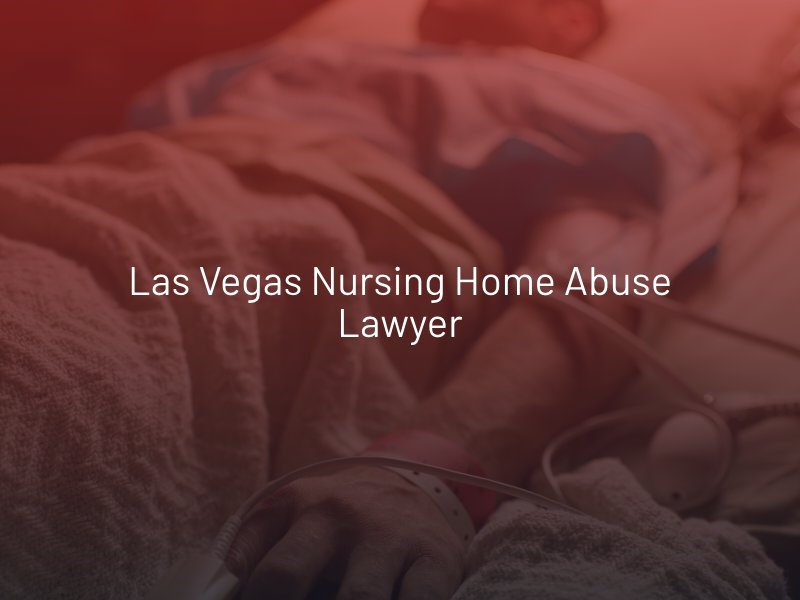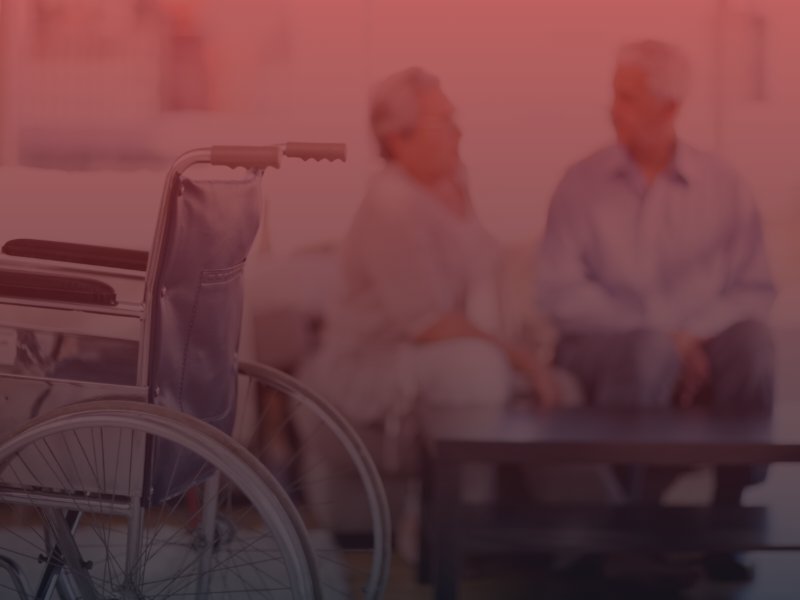Las Vegas Nursing Home Abuse Lawyer
We skillfully advocate for nursing home abuse victims throughout Nevada, California, Arizona, and Utah. Contact our Las Vegas nursing home abuse lawyers to speak about your elderly abuse case in a free and confidential consultation.
Families spend a lot of money to ensure that their loved ones receive the proper care and attention they deserve. Unfortunately nursing homes and assisted living facilities do not always live up to those standards. When a family finds out that a family member has been subjected to a hostile environment and care due to nursing home neglect or abuse, it is only natural to feel outraged.

Navigate This Page
- How Can a Las Vegas Nursing Home Abuse Attorney Help?
- What is Nursing Home Abuse?
- Signs and Symptoms of Nursing Home Abuse
- What are Common Nursing Home Injuries?
- What To Do If You Suspect Nursing Home Abuse
- Nevada Nursing Home Laws
- Contact a Las Vegas Nursing Home Abuse Attorney Today
How Can a Las Vegas Nursing Home Abuse Attorney Help?
Our Harris & Harris experienced personal injury attorneys understand the importance of finding answers and pursuing accountability on our client’s behalf. We pride ourselves on defending our clients and their loved ones, as well as standing up for the victims of nursing home abuse and neglect. Not only have our clients suffered an injustice by spending money for care that was not only properly provided, but now their loved one has suffered both mentally and physically as a result of inadequate care.
What is Nursing Home Abuse?
Nursing home abuse occurs when someone in a position of trust directly harms a resident. Nursing home abuse can take many forms, including:
- Physical Abuse: any type of intentional act to cause injury to another person, such as punching, pushing, grabbing, improper physical restraints for a patient, untreated infections and bedsores, and so on.
- Sexual Abuse: any unwanted sexual contact, including sexual assault, unwanted sexual advances, or harassment, the failure to protect residents from non-consensual sexual contact if the resident cannot legally consent (e.g., Alzheimer’s or dementia).
- Emotional Abuse: emotional or psychological abuse refers to the deliberate infliction of fear or anguish through verbal threats, intimidation, or other forms of maliciousness. This type of abuse can be very subtle and is often not evident to families of loved ones in nursing homes.
- Financial Abuse: when a resident’s money or other assets are taken without their consent or full understanding. Nursing home staff may forge signatures on checks, use their credit cards, coerce them into giving up control of assets, etc.
Neglect is slightly different, as a patient is harmed because of substandard care or the failure to perform crucial caregiving responsibilities (negligence). For example:
- Medical Neglect: failing to treat or prevent a resident’s medical concerns, such as failing to administer medications when needed, not regularly repositioning a patient to prevent bedsores, improper care for existing health conditions (e.g., diabetes)
- Basic Needs Neglect: failing to provide a resident with adequate food and water or a safe and clean environment.
- Personal Hygiene Neglect: nursing home residents may not receive the help they need with basic hygiene, such as bathing, grooming, laundry, dental care, and general cleanliness.
- Social or Emotional Neglect: very difficult to identify, as the signs can be subtle rather than obvious. Staff members may shout, threaten, swear at, or bully residents. On the other hand, they may simply fail to interact with the residents in a friendly manner, leading to emotional neglect. Feelings of isolation can result in depression, residents retreating to their rooms, and withdrawing from everyday activities.
Signs and Symptoms of Nursing Home Abuse
When an injury or accident does occur, the nursing home must notify a family member of the resident and the resident’s physician. They also must incorporate appropriate interventions into the resident’s plan of care to stop the injury from reoccurring. The following signs and symptoms may indicate a resident is not receiving adequate care and may be a victim of nursing home abuse or neglect:
- Unexplained bruises or injuries, such as black eyes, bruises, cuts, welts, burns, sprains, dislocations, broken bones (including skull fractures), and internal injuries/bleeding.
- Declines in personal hygiene. Soiled bedding, fecal / urine smell, or inadequate clothing.
- Physical signs of being restrained, such as rope marks/burns, restraints are visibly present in their room (e.g., belts, straps, rope, etc.)
- Broken eyeglasses/frames, hearing aids, etc.
- Bruising or bleeding around the genital area or breasts.
- Venereal disease or genital infections.
- Torn, stained, bloody underwear or clothes.
- Being emotionally upset or agitated.
- Unexplained or uncharacteristic changes in behavior, such as withdrawal from normal activities or unexplained changes in alertness.
- Unusual sucking, biting, rocking, or similar behavior usually attributed to dementia.
- Increased agitation around certain nursing home staff members or residents.
- Staff members are reluctant to let you see or be along with a resident.
- Unexplained disappearance of money, valuable possessions, or stocks.
- Abrupt changes to a resident’s will or other financial documents, including access to bank cards or accounts by new people.
- Discovery of the resident’s forged signature for financial transactions or changes in titles to real estate or other property.
- Phony accounts in the resident’s name.
If a resident reports that he or she is being abused or neglected, do not ignore a complaint. Ask about specifics and see whether there is any evidence supporting their claim.
What are Common Nursing Home Injuries?
Unfortunately, many nursing homes are underfunded, overcrowded and understaffed. Additionally, the nurses and care assistants who tend to the nursing home residents are frequently under-trained. This combination of factors contributes to many injuries that potentially could have been avoidable, including:
- Fractures From Falls: a bone fracture is a severe medical condition where there is a break in a bone’s continuity. All bone fractures are broadly categorized as either: closed fractures, open fractures, or compression fractures.
- Infections From Bedsores: also known as pressure ulcers, bedsores will appear on areas of the skin under constant pressure. If a person is lying or sitting still for long periods of time, such as in a bed or a wheelchair, they are likely to develop bedsores. If left untreated, these open wounds can become infected. Untreated infections can rapidly progress and lead to shock, pulmonary arrest, and death. Bedsores should not occur in a patient who enters a nursing home without them.
- Malnutrition: caused by a lack of food or the inability to absorb the nutrients in food. It can lead to physical weakness, which increases the risk of falling and developing infections or other medical problems.
- Dehydration: may be caused by illness with high fever, diarrhea, certain medications such as diuretics, or the deficient intake of liquids. This condition is especially dangerous for older adults, and they are at an increased risk of dehydration. Particularly if they have mobility problems that limit their ability to obtain water for themselves.
- Complications from Medication Errors: a variety of serious medical problems can occur if the wrong medication is administered, from an improper dose of medication, or if it is given at incorrect intervals.
- Wrongful Death: when negligence on behalf of the nursing home administration or staff contributes to a resident’s death. Surviving family members then have the right to file a wrongful death lawsuit for compensation. Common mistakes that can be fatal to residents include:
- Prescribing an incorrect dosage of medication.
- Allowing a cognitively impaired resident to wander outside of the premises.
- Failure to monitor and adequately treat a medical condition.
- Failure to provide residents with proper nutrition and hydration.
- Failure to protect residents from violent visitors.
Elderly residents of a nursing home are particularly vulnerable to serious illness or infection. When seriously injured, it can be difficult to recover fully. In fact, many elderly individuals who suffer from a serious injury in a nursing home or rehabilitation hospital slowly decline over the months until, eventually, their body just gives up.
Had they received the proper care and attention they deserved from the beginning, the initial injury or illness may never have occurred.
What To Do If You Suspect Nursing Home Abuse
If you suspect that your loved one is experiencing abuse or neglect at their nursing home, trust your gut and take action immediately. Call 911 if you believe they are in immediate danger.
If not, notify the facility’s administration, as they are required to check into the reported abuse and make changes. Follow up to see if any action is taken to remedy the situation, such as launching an investigation or firing the alleged offender. When that doesn’t work, report your suspicions to Adult Protective Services (APS) of Nevada’s Aging and Disability Services (ADSD) at:
- Las Vegas/Clark County: (702) 486-6930
- Statewide/All other areas: (888) 729-0571
- Crisis Support Services of Nevada 24/7: (775) 440-6490
Once you call, an assessment will be completed to determine the degree of danger your loved one is in and the appropriate course of action. A long term care ombudsman can also be reached at these above listed numbers. An ombudsman is an advocate for nursing home residents’ rights and will fight to get your loved one proper care.
Hire a lawyer next. Our Las Vegas nursing home abuse attorneys do everything possible to hold nursing home staff and care facilities accountable for their negligent or abusive actions. We will fight for your family members if they have suffered from physical abuse, untreated bed sores, sexual abuse, emotional abuse, and/or financial exploitation.
Nevada Nursing Home Laws
Nevada has established laws designed to protect nursing home residents from abuse or neglect.
Nevada’s Abuse, Neglect, Exploitation or Isolation of Older and Vulnerable Person’s Act (NRS 200.5099)
This law makes it a crime to abuse, neglect, or exploit people who are 60 or older. First-time convictions of elder abuse are prosecuted as either a class C felony or a gross misdemeanor.
- Gross Misdemeanor: carries a penalty of up to 364 days in jail and/or up to $2,000 in fines, as well as victim restitution.
- Category C Felony: carries a penalty of one to five years in prison, up to $10,000 in fines, and victim restitution.
If the victim suffers substantial bodily or mental harm, first-time convictions are prosecuted as a category B felony, which carries a penalty between two to 20 years in prison.
The penalties for elder exploitation will vary based upon the amount of money the victim lost and if it was a first-time or subsequent offense.
Nevada Statute of Limitations
The statute of limitations for abuse in nursing homes depends on the type of claim under which you are filing in civil court. Typical forms of Nevada nursing home abuse cases include personal injury, medical malpractice, and wrongful death.
Here are the general deadlines by which you must file a lawsuit, according to the type of case:
- Nursing Home Negligence or Abuse (personal injury NRS 11.190): two years from the date of the injury or when it should have been discovered.
- Medical Malpractice (NRS 41A.097): three years from the date of the injury or one year from when the injury was discovered or should have reasonably been discovered (whichever period is shorter).
- Wrongful Death (NRS 11.190): Up to two years from the date of the resident’s death.
Failing to file a nursing home abuse case within the specified time limits may prevent you from pursuing any type of compensation in civil court.
Contact a Las Vegas Nursing Home Abuse Attorney Today
With over 15 years of experience handling personal injury cases of all sorts, you can trust our Las Vegas nursing home abuse lawyers at Harris & Harris Injury Lawyers to fight hard for your elder abuse case in Clark County. Give us a call at (702) 384-1414 for a free consultation or contact our law firm online.



